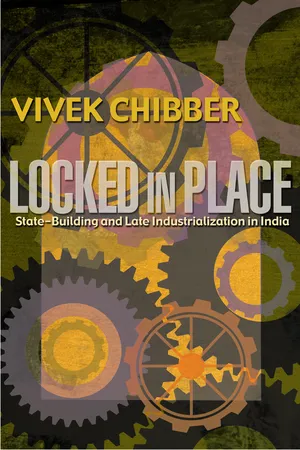
- 360 pages
- English
- ePUB (mobile friendly)
- Available on iOS & Android
About this book
Why were some countries able to build "developmental states" in the decades after World War II while others were not? Through a richly detailed examination of India's experience, Locked in Place argues that the critical factor was the reaction of domestic capitalists to the state-building project. During the 1950s and 1960s, India launched an extremely ambitious and highly regarded program of state-led development. But it soon became clear that the Indian state lacked the institutional capacity to carry out rapid industrialization. Drawing on newly available archival sources, Vivek Chibber mounts a forceful challenge to conventional arguments by showing that the insufficient state capacity stemmed mainly from Indian industrialists' massive campaign, in the years after Independence, against a strong developmental state.
Chibber contrasts India's experience with the success of a similar program of state-building in South Korea, where political elites managed to harness domestic capitalists to their agenda. He then develops a theory of the structural conditions that can account for the different reactions of Indian and Korean capitalists as rational responses to the distinct development models adopted in each country.
Provocative and marked by clarity of prose, this book is also the first historical study of India's post-colonial industrial strategy. Emphasizing the central role of capital in the state-building process, and restoring class analysis to the core of the political economy of development, Locked in Place is an innovative work of theoretical power that will interest development specialists, political scientists, and historians of the subcontinent.
Frequently asked questions
- Essential is ideal for learners and professionals who enjoy exploring a wide range of subjects. Access the Essential Library with 800,000+ trusted titles and best-sellers across business, personal growth, and the humanities. Includes unlimited reading time and Standard Read Aloud voice.
- Complete: Perfect for advanced learners and researchers needing full, unrestricted access. Unlock 1.4M+ books across hundreds of subjects, including academic and specialized titles. The Complete Plan also includes advanced features like Premium Read Aloud and Research Assistant.
Please note we cannot support devices running on iOS 13 and Android 7 or earlier. Learn more about using the app.
Information
Table of contents
- Cover
- Half title
- Title
- Copyright
- Contents
- Preface
- Acknowledgments
- List of Abbreviations
- Part I: The Issues and the Argument
- Part II: Installing the State
- Part III: Reproducing the State
- Notes
- Bibliography
- Index